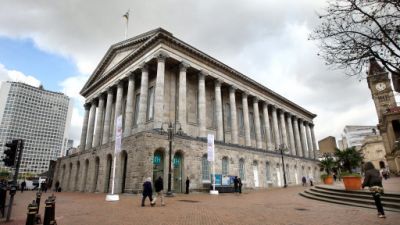Half of jobs at Birmingham Town Hall and Symphony Hall at risk of redundancy

Birmingham's Town Hall and Symphony Hall (THSH) have entered a period of redundancy consultation following an extended closure due to Covid-19.
Bosses have said half of their staff are at risk of redundancy as they attempt to survive the pandemic.
In a statement, the company said it must take the "painful decision" to reduce staff due to the continuing uncertainty ahead.
Chief executive Nick Reed said the news was "heartbreaking". He added: "Music has the power to bring people together and it fills me with great sadness that we remain unable to bring people together in our halls."
The consultation comes despite being awarded emergency relief funding by Arts Council England.
To have "any chance of survival", the company says it desperately needs "a time-based reopening strategy from the government and the funding to reach that point". The venues employ 65 staff with 35 at risk of redundancy.
THSH says those affected have been contacted and "no final decision" for redundancies we will be made until the consultation process has been completed.
The news follows similar redundancy announcements from Birmingham's Repertory Theatre and Birmingham Hippodrome.
In a statement, a spokesperson for the theatre said that since 16 March 2020, The REP has effectively been unable to trade.
It said the decision had been made despite the 'very welcome news' earlier this week of the Government’s support package for the cultural sector, and Arts Council England’s emergency funds that partially mitigate its current losses.
But it said that the reality is that it simply does not know when it will be able to re-open its doors and welcome audiences back into its building to enjoy live theatre again in a way that is safe for the public and financially viable for the theatre.
Read more: